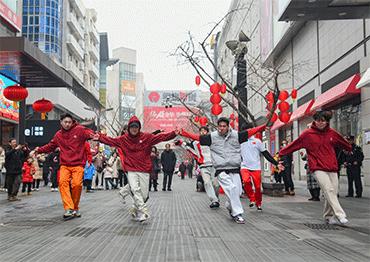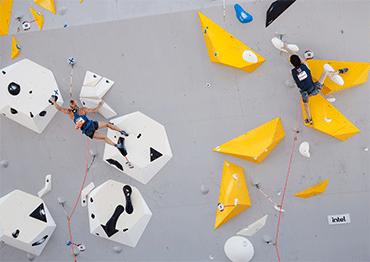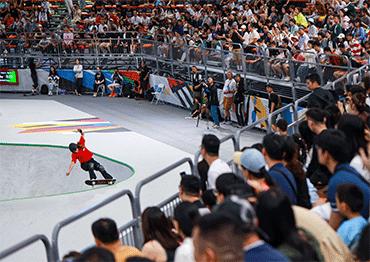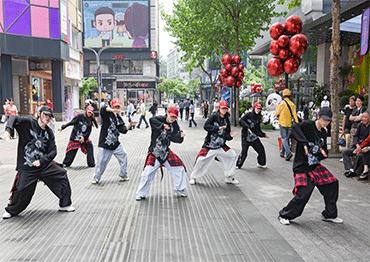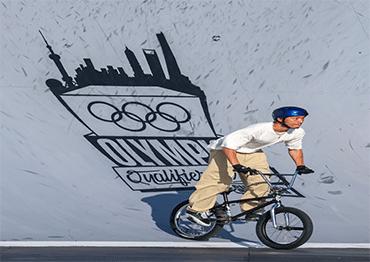Ahead of the 2024 Paris Games, the first Olympic Qualifier Series concluded at Huangpu Riverside Urban Park in Shanghai on May 19. Over four days, 464 Olympic hopefuls from 120 countries and regions competed for 150 slots in four events: breaking (also known as break-dancing), skateboarding, sport climbing and freestyle BMX.
The second qualifier round was held in Budapest, Hungary in June. Athletes with the highest total points from the two rounds will secure spots for Paris 2024.
The four-day event also celebrated street sports and culture, attracting about 45,000 fans. Wang Yibo, a 26-year-old pop star known for his passion for skateboarding and breaking, served as the event’s ambassador. He called on young people to join him in “celebrating sports, culture and creativity.” In the month leading up to the event, the park hosted the Urban Sports Festival, where people could experience these sports, plus music and cultural activities.
Breaking and sport climbing made their Olympic debuts at the 2018 Summer Youth Olympics in Buenos Aires. Paris 2024 will be the first time breaking competitors, known as B-boys and B-girls, can compete for Summer Olympic medals.
Skateboarding, freestyle BMX and sport climbing were included in the 2020 Tokyo Games held in 2021. The inclusion of any new sport proposed by a host city must be approved by the International Olympic Committee (IOC).
Adding street sports aims to make the Olympic programs “more genderbalanced, more youthful and more urban,” said IOC President Thomas Bach in March 2019 following the IOC’s decision to support Paris 2024’s proposal to include breaking, skateboarding, sport climbing and surfing.
In China, street sports have been rapidly developing. There are 10 million B-boys and B-girls enrolled in nearly 10,000 training institutions, according to a China Hip-Hop Union Committee report released in May 2023. Chinese riders dominated the women’s freestyle BMX podium at the Olympic qualifiers in Shanghai.
Fan Hong, executive dean of the Institute of Olympic Studies and Research at the Shanghai University of Sport, sat down with China News Service in May to discuss the development of street sports in China and how they contribute to exchanges between China and the rest of the world.
Sport climbing is practiced by over 25 million climbers in 150 countries, with 39 percent of climbers under 18 years old. There are three main formats. Lead climbing involves reaching the highest point on a 15-meter wall within six minutes. Speed climbing is a race for time, while bouldering sees climbers compete to conquer a 4.5-meter wall with the fewest attempts within a time limit. The first organized lead competition, SportRoccia, was held in 1985 in Bardonecchia, near Turin, Italy, and the first competition on an artificial climbing wall took place in Vaulx-en-Velin, near Lyon, France in 1986. For Paris 2024, there will be two medal events: combined (bouldering and lead) and speed. Sport climbing will also be featured in the Los Angeles 2028 Olympic Games.
Originally known as “sidewalk surfing” in the 1950s and 1960s, skateboarding emerged as an alternative to surfing when there were no waves. The first skateboard competition was held in California in 1963. The sport has since faced ups and downs due to safety concerns, but has seen significant growth in part to advancements in equipment technology. Two skateboarding events will be held at La Concorde Urban Park in Paris this summer: park and street. Park skating features aerial and lip tricks performed in a concrete bowl course with several different forms of transition, including ramps, quarter pipes and bumps. Street skating courses mimic obstacles often found in an urban environment, such as stairs, banks, ledges, curbs and handrails. Much like figure skating or gymnastics, each program is timed and judged.
Developed in the Bronx, New York in the 1970s as part of hip-hop culture, breaking is characterized by its improvisational nature and challenging movements. B-boys and B-girls perform to music chosen by a DJ without prior knowledge of the tracks. The unpredictability of the music adds an intriguing element to competitions, making each performance unique.
Inspired by BMX racers, teens in 1970s California created freestyle BMX. This sport involves riders performing spins, flips, tail whips and aerial tricks on ramps, jumps, rails and other obstacles within a 60-second timeframe. Governed by the Union Cycliste Internationale (UCI), freestyle BMX has been featured in extreme sport competitions since the 2000s. The first BMX Freestyle World Cup, organized by the UCI, took place in 2016 as part of the International Festival of Extreme Sports (FISE) in Montpellier, France.
China News Service: How did these four street sports make it into the Olympic program?
Fan Hong: Throughout the century-long history of the Olympics, there have been unique sports. For example, the tug-of-war was a medal event at the 1900 Paris Games and remained until the 1920 Antwerp Games. Bowling and hot-air ballooning featured in the 1900 Paris Games as unofficial events. Including a sport in the Olympics is significant because it promotes global awareness and generates business opportunities.
According to the Olympic Charter, sports with notable international reach are qualified for inclusion in the Olympic program. A men’s event must be practiced in at least 75 countries and regions across four continents, and a women’s event must be practiced in at least 40 countries and regions across three continents. Youth participation is also an important factor.
Freestyle BMX debuted at the Tokyo 2020 Games as an official medal event. The addition of breaking, skateboarding and sport climbing to the Olympic program was proposed by the 2024 Paris Games Committee. As IOC President Thomas Bach has said, the addition of new sports will make the Olympic program “more gender-balanced, more youthful and more urban.”
Then the IOC launched the Olympic Qualifier Series for these four street sports. The series provides an international stage for athletes to display their skills and secure slots for the 2024 Paris Games. It not only shows the IOC’s commitment to these new events, but also the inclusiveness and adaptability of the Olympics to youth culture.
CNS: What’s the difference between these four street sports and traditional events?
FH: Their differences lie in their origins, cultural backgrounds, competition styles and scoring system. Most importantly, these new sports emphasize individual expression, creativity and the value of visual appeal, while traditional events focus more on athlete competition and widespread participation. All four new sports events originated from street culture. They are characterized by their freedom, trendiness and improvisation. The equipment used is not fixed. They value challenges and creativity. This requires athletes to be courageous in learning new skills and adapting to new environments. Adding these new events is expected to inject youthful energy to the Olympic Games and reflect the Olympics’ inclusiveness and promotion of street culture. Since these events are very popular among young people, they will attract younger audiences and align the Olympics with modern culture.
Olympic reforms have always aimed to keep the Games relevant to changing times and societal demand. The Olympic Qualifier Series is an example of trying new things, integrating globalization, cultural diversity, technological innovation and sustainable development to maintain the Olympics’ position as a leading global sports event and promote peace and cultural exchange.
CNS: How can street sports boost cultural exchanges between China and the rest of the world?
FH: Take breaking as an example. At the Hangzhou Asian Games in July 2023, Chinese B-girls incorporated kung fu moves in their performances. One of them, Liu Qingyi, won the women’s championship, qualifying for the 2024 Paris Games.
Olympic competitors must research and learn from each other. When B-boys and B-girls study their competitors’ music choice and moves, they need to understand the cultural backgrounds and meanings behind them.
The inclusion of street sports in the Olympics is what made the Olympic Qualifier Series possible. The series offers competitors and audiences around the world a chance to understand and experience the cultures of host cities and other places through interaction. This will boost cultural diversity.
At the 138th IOC Session [in July 2021], IOC members unanimously added the word “Together” to the Olympic motto, making it “Faster, Higher, Stronger – Together.” It is expected that a broader participation of young athletes and audiences worldwide will fuel enthusiasm for sports and improve solidarity through exchanges during the Games.
CNS: How should China develop street sports?
FH: First off, we need to promote street sports to a broader audience and provide infrastructure.
Street sports enthusiasts require more training courses and competitive events. Also, commercial operations, brand building and social media campaigns can boost the popularity and skill levels of street sports. Last but not least, encouraging youth participation will foster cultural innovation and integration, creating street culture with Chinese characteristics.
Some street sports are already developing rapidly in China. For example, sport climbing is thriving in Shanghai. There are about 90 sport climbing gyms and a professional training center in the city’s Fengxian District. The climbing area [at Vankoo Sports Works] in Baoshan District is one of the largest commercial sport climbing venues [with a 1,500 square meter climb wall area], offering multiple routes for speed climbing, lead climbing and bouldering.
Although these street sports originated in other countries, Chinese athletes are starting to shine. At the Union Cycliste Internationale (UCI) BMX Freestyle World Cup held in Gold Coast, Australia in December 2022, Sun Jiaqi became the first Chinese champion in the sport. Her teammate Deng Yawen set a world record high score at the 2023 UCI BMX Freestyle World Cup in Bazhong, Sichuan Province, defeating Hannah Roberts, a five-time world champion from the US, and Charlotte Worthington from the UK, the Tokyo Games gold medalist.
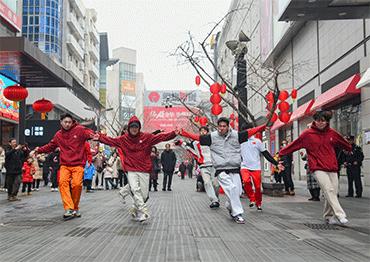
 Old Version
Old Version
